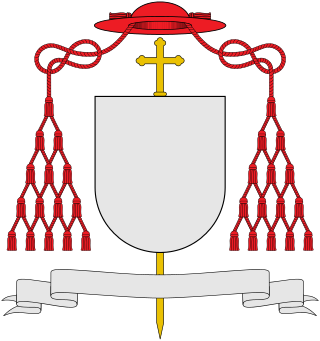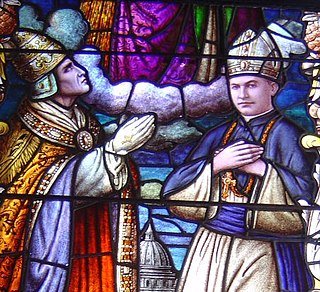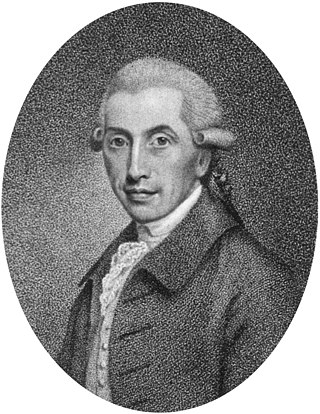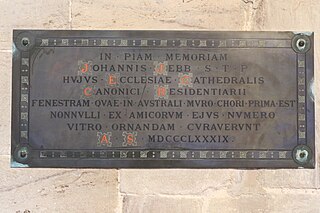
A cardinal is a senior member of the clergy of the Catholic Church. Cardinals are created by the pope and typically hold the title for life. Collectively, they constitute the College of Cardinals.

The Council of Chalcedon was the fourth ecumenical council of the Christian Church. It was convoked by the Roman emperor Marcian. The council convened in the city of Chalcedon, Bithynia from 8 October to 1 November 451 AD. The council was attended by over 520 bishops or their representatives, making it the largest and best-documented of the first seven ecumenical councils. The principal purpose of the council was to re-assert the teachings of the ecumenical Council of Ephesus against the teachings of Eutyches and Nestorius. Such doctrines viewed Christ's divine and human natures as separate (Nestorianism) or viewed Christ as solely divine (Monophysitism).

The Eastern Catholic Churches or Oriental Catholic Churches, also called the Eastern-Rite Catholic Churches, Eastern Rite Catholicism, or simply the Eastern Churches, are 23 Eastern Christian autonomous particular churches of the Catholic Church, in full communion with the Pope in Rome. Although they are distinct theologically, liturgically, and historically from the Latin Church, they are all in full communion with it and with each other. Eastern Catholics are a distinct minority within the Catholic Church; of the 1.3 billion Catholics in communion with the Pope, approximately 18 million are members of the eastern churches.

Ordination is the process by which individuals are consecrated, that is, set apart and elevated from the laity class to the clergy, who are thus then authorized to perform various religious rites and ceremonies. The process and ceremonies of ordination vary by religion and denomination. One who is in preparation for, or who is undergoing the process of ordination is sometimes called an ordinand. The liturgy used at an ordination is sometimes referred to as an ordination.
Defrocking, unfrocking, degradation, or laicization of clergy is the removal of their rights to exercise the functions of the ordained ministry. It may be grounded on criminal convictions, disciplinary problems, or disagreements over doctrine or dogma, but may also be done at their request for personal reasons, such as running for civil office, taking over a family business, declining health or old age, desire to marry against the rules for clergy in a particular church, or an unresolved dispute. The form of the procedure varies according to the Christian denomination concerned.
In the canon law of the Catholic Church, the loss of clerical state is the removal of a bishop, priest, or deacon from the status of being a member of the clergy.

An ordinary is an officer of a church or civic authority who by reason of office has ordinary power to execute laws.
A coadjutor bishop is a bishop in the Catholic, Anglican, and (historically) Eastern Orthodox churches whose main role is to assist the diocesan bishop in the administration of the diocese. The coadjutor is a bishop himself, although he is also appointed as vicar general. The coadjutor bishop is, however, given authority beyond that ordinarily given to the vicar general, making him co-head of the diocese in all but ceremonial precedence. In modern times, the coadjutor automatically succeeds the diocesan bishop upon the latter's retirement, removal, or death.

John Jebb (1736–1786) was an English divine, medical doctor, and religious and political reformer.
The hierarchy of the Catholic Church consists of its bishops, priests, and deacons. In the ecclesiological sense of the term, "hierarchy" strictly means the "holy ordering" of the church, the Body of Christ, so to respect the diversity of gifts and ministries necessary for genuine unity.
The term "coadjutor" is a title qualifier indicating that the holder shares the office with another person, with powers equal to the other in all but formal order of precedence.

John Jebb was an Irish churchman and writer.

Francis de Witt Batty OBE was the 7th Anglican Bishop of Newcastle in Australia from 1931 until his retirement in 1958.

Samuel Hallifax or Halifax (1733–1790) was an English churchman and academic, holder of several chairs at Cambridge and was successively Bishop of Gloucester (1781–1789) and Bishop of St Asaph (1789–1790).

John Jebb was an Anglo-Irish Anglican priest and writer on church music.

The Dean of Cashel is the head of the Chapter of the Cathedral Church of St John the Baptist and St Patrick's Rock, Cashel, one of the Church of Ireland cathedrals of the united Diocese of Cashel, Ferns and Ossory.
In the canon law of the Catholic Church, exclaustration is the official authorization for a member of a religious order bound by perpetual vows to live for a limited time outside their religious institute, usually with a view to discerning whether to depart definitively.
Richard Jebb (1766–1834) was an Anglo-Irish judge of the nineteenth century. He was a member of a gifted family of English origin, which produced a celebrated doctor, three distinguished clerics, and a noted classical scholar.

In canon law, a canon designates some law promulgated by a synod, an ecumenical council, or an individual bishop.
John Jebb was an Irish Anglican priest in the second half of the 18th century.











